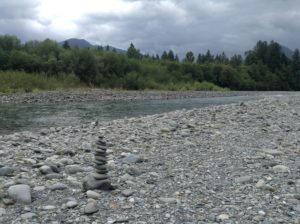Years ago, I went camping with a woman who ground her teeth. She told me beforehand that she was a tooth clencher, but I didn’t realize the enormity of what she was telling me until it was far too late.
 We had pitched our tent on a rocky, willow-laden spit of land right next to the Colorado River. The moving water lulled us to sleep, and the breeze off the water kept the bugs at bay. It had been an active day at the tail end of a long crazy week, and we were tired. Our exhaustion coupled with the beautiful scenery made it easy to fall to sleep that night.
We had pitched our tent on a rocky, willow-laden spit of land right next to the Colorado River. The moving water lulled us to sleep, and the breeze off the water kept the bugs at bay. It had been an active day at the tail end of a long crazy week, and we were tired. Our exhaustion coupled with the beautiful scenery made it easy to fall to sleep that night.
In the week hours I was awakened to a loud screeching sound. Clearly it was a wild animal—either poised to attack our tent, or maybe it was in mortal pain. I sat up, unzipped the tent flap and looked outside. Huh!…nothing. I was too afraid to get out of the tent, so I zipped up and waited for the oncoming attack. The sound was still there, and it was loud. And then I realized it was coming from inside the tent. Wait…what? I looked over and realized that it was my tent mate blissfully off in dreamland grinding her teeth at about 180 decibels.
My friend is not alone. Clenching, tooth grinding, and TMJ (temporomandibular joint) pain affect millions of people. The fallout from these conditions can be facial and tooth pain, jaw clicking, headaches, neck pain, and even cracked and broken teeth. Clenching and grinding can be insidious, as most people are unaware that they’ve got their jaws clenched shut, and many are doing so at night. More often than not, their symptoms are worse when their stress is worse.
I am asked regularly by my patients if acupuncture can help with their clenching and jaw pain. Clinically, I have found that acupuncture and Chinese medicine can alleviate not only the pain, muscle tightness, and clenching, but can also calm the stress that is frequently causing their symptoms.
It turns out that there is now research that backs up my findings in the clinic. In a Brazilian study of dental patients suffering from TMJ pain, researchers found that after three months of acupuncture, the patients experienced significantly less pain, increased strength of their bite and decreased EMG (electromyographic) activity of the masticatory (chewing) muscles. While this study was small, it opens the door for more research, and indicates that acupuncture can be effective for people suffering from TMJ pain and jaw clenching.
As for my camping friend, I’ve not shared a tent with her since our night on the Colorado River, but she has had acupuncture repeatedly over the years, and is no longer making wild noises in the night–at least not from grinding her teeth.



